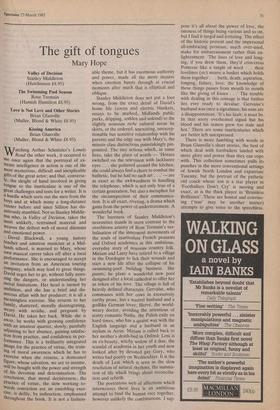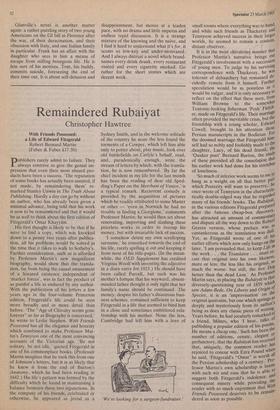The gift of tongues
Mary Hope
Valley of Decision Stanley Middleton (Hutchinson £8.95) The Swimming Pool Season Rose Tremain (Hamish Hamilton £8.95) Love is Not Love and Other Stories Brian Glanville (Muller, Blond & White £8.95) Kissing America Brian Glanville (Muller, Blond & White £8.95)
Watching Arthur Schnitzler's Lonely Road the other week, it occurred to me once again that the portrayal of ex- treme intelligence in action is one of the most mysterious, difficult and inexplicable gifts of the great actor; and that, converse- 1Y, the sleight of hand involved in giving tongue to the inarticulate is one of the great challenges and tests for a writer. It is a hurdle which sorts out the men from the boys and at which many a long-distance runner before and since Sillitoe has dis- astrously stumbled. Not so Stanley Middle- ton who, in Valley of Decision, takes the most unlikely, restrained material and weaves the deftest web of moral dilemma and emotional power. David Blackwall, a young history teacher and amateur musician at a Mid- lands school, is married to Mary, whose own musical career takes off after a local performance. She is encouraged to accept an invitation from an American touring company, which may lead to great things. David urges her to go, without fully asses- sing the dangers, or understanding her moral limitations. Her head is turned by ambition, and she has a brief and dis- astrous affair with her producer; it is all a meaningless exercise. She returns to her family, shattered, morally disintegrating, weary with accidie, and pregnant by David. He takes her back. While she is away, he works with growing confidence with an amateur quartet, slowly, painfully adjusting to her absence, gaining satisfac- tion from practice, and confidence in per- f.ormance. This is a brilliantly integrated image for the practice of virtue, the train- ing of moral awareness which he has to exercise when she returns, a demeaned figure, whose salvation, we are to assume, will be bought with the power and strength of his devotion and determination. The conclusion, that moral decisiveness, the practice of virtue, the slow working to- Wards conviction are an ennobling exer- cise, is deftly, by indirection, emphasised throughout the book. It is not a fashion-
able theme, but it has enormous authority and power, made all the more incisive when emotion bursts through at crucial moments after much that is elliptical and oblique.
Stanley Middleton does not put a foot wrong, from the exact detail of David's home life (cocoa and electric blankets, essays to be marked, Midlands public parks, dripping, sodden and unkind) to the slightly nouveau riche cultural scene he skirts, or the ordered, unexciting, unexcep- tionable but sensitive relationship with his parents and the edgy one with Mary's, the minute class distinctions painstakingly pin- pointed. The tiny actions which, in some lives, take the place of words — 'Horace switched on the television with lacklustre eyes . . . she pottered around the kitchen, she could always find a chore to combat the bathetic, but he had no such art . . — are as exact as the awkwardness in handling the telephone, which is not only true of a certain generation, but also a metaphor for the circumspection of their communica- tion. It is all exact, riveting, a drama which gains from the power of understatement. A wonderful book.
The bareness of Stanley Middleton's necessities stands in stern contrast to the overblown artistry of Rose Tremain's ver- balisation of the innermost movements of the souls of inarticulate French peasants and Oxford academics in this ambitious, everyday story of nouveau country folk. Miriam and Larry have retired to a village in the Dordogne to lick their wounds and start a new life after the collapse of his swimming-pool building business. She paints; he plans a wonderful new pool designed after a local cathedral to offer her as token of his love. The village is full of heavily defined characters: Gervaise, who communes with her cows in excessively earthy prose, has a wastrel husband and a godlike German lover; Nerve, the world- weary doctor, avoiding the attentions of scatty romantic Nadia, the Polish exile on hard times, who has a quaint way with the English language and a husband in an asylum in Arras. Miriam is called back to her mother's death-bed in Oxford: Leni is an ex-beauty, witchy widow of a don, the scandal of academia in her youth and now looked after by devoted gay Gary, who writes bad poetry on Wednesdays. It is the death of Leni which is seen as the slow resolution of natural rhythms, the summa- tion of life which brings about reconcilia- tion and rebirth.
The portentous web of affections which interweaves these lives is an ambitious attempt to bind the human race together, however unlikely the combinations. I sup- pose it's all about the power of love, the oneness of things being various and so on, but I find it turgid and irritating. The effect of the historic present and the impersonal all-embracing pronoun, much over-used, make for embarrassment rather than en- lightenment: 'The lines of love and long- ing, if you drew them, they'd criss-cross Pomerac like a tangle of wool . . . their lovelines (sic) weave a basket which holds them together . . . birth, death, aspiration, longing, failure, love: the knowledge of these things passes from mouth to mouth like the giving of kisses . . .' The trouble with dealing in this coinage is that bathos lies ever ready to devalue: Gervaise's husband was once a signalman; his sons are a disappointment. 'It's his fault; it must be. In that sooty overheated signal but his blood and his semen grew too stale and hot.' There are some inarticulacies which are better left unexpressed.
There is more fumbling with words in Brian Glanville's short stories, the best of which deal with footballers landed with more glory and power than they can cope with. This collection sometimes pulls its punches in the more conventional settings of Jewish North London and expatriate Tuscany, but the portrait of the pathetic old coach whose son is a star player in 'Footballers Don't Cry' is moving and exact, as is the thick player in 'Brainless Brilliance'. These are honest and convinc- ing ('true' may be another matter) attempts to give voice to the speechless. Glanville's novel is another matter again: a rather puzzling story of two young Americans on the GI bill in Florence after the war, of their deracination, and their obsession with Italy, and one Italian family in particular. Frank has an affair with the daughter who sees in him a means of escape from stifling bourgeois life. He is less sure of his motives. Tom, his buddy, commits suicide, foreseeing the end of their time out. It is about self-delusion and
disappointment, but moves at a leaden pace, with no drama and little impetus and endless tepid discussion. It is a strange mixture of the knowing and the naive, and I find it hard to understand what it's for, it seems so low-key and under-motivated. And I always distrust a novel which brand- names every drink drunk, every restaurant visited and every cigarette smoked. Go rather for the short stories which are decent work.















































 Previous page
Previous page